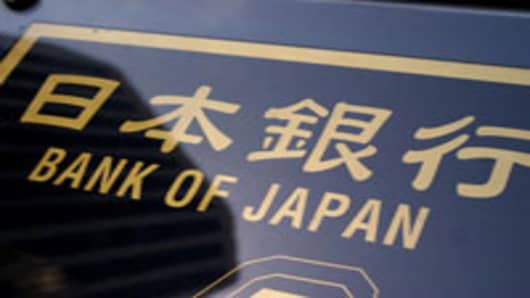The Bank of Japan forecast on Friday that inflation will rise to around 2 percent towards the latter half of the next three years due to its massive stimulus plan, a projection analysts say may be too optimistic.
In a reminder of the task ahead, data on Friday showed core consumer prices marked their fifth straight month of annual declines in March even as the yen's recent falls pushed up import costs.
The central bank, charged with overturning years of dogged deflation, held off on offering any fresh policy initiatives after new Governor Haruhiko Kuroda had stunned markets on April 4 by promising to inject about $1.4 trillion into the economy to hit the inflation target in roughly two years.
(Read More: Consumer Prices in Japan Fall for 5th Straight Month)
In a semi-annual economic report, the central bank forecast that core consumer prices, which exclude volatile food prices but include oil, will rise 1.9 percent in the fiscal year to March 2016. Japan is likely to achieve 2 percent inflation in the latter half of the central bank's projection period out to March 2016, it said.
The projections are much higher than the forecasts of 10 private-sector economists gathered in a Reuters poll this week, underlining the doubts that the 2 percent inflation target can be reached so quickly. The poll shows a median forecast of around 1 percent in 2015/16.
"Even under a very optimistic growth forecast, it's hard to predict Japan seeing 2 percent inflation in two years. The BOJ will have to come up with a logic quite different from the past to explain why it thinks the target is achievable," Junko Nishioka, chief Japan economist at RBS Securities, said before the BOJ released the forecasts.
"If evidence piles up that progress in meeting the price target is too slow, the central bank may come under pressure to ease again at its quarterly review of growth projections in July and October," she said.
(Read More: Risk of Bond Market Revolt in Japan: Expert)
Kuroda has vowed to do whatever it takes to achieve the price target in two years, putting the central bank's reputation on the line to restore an inflation level that has rarely been hit since the early 1990s.
Dilemma
The BOJ reiterated after a policy meeting on Friday a pledge to expand base money, its new policy target, at an annual pace of 60 trillion yen ($604 billion) to 70 trillion yen. Base money is the combined amount of cash and deposits parked with the central bank.
Government data on Friday showed that core consumer prices, which exclude volatile food but include oil costs, fell 0.5 percent in March from a year earlier.
(Read More: Sentiment Turning for Japan Stocks? Foreign Investors Bail)
In the BOJ report, it forecast stronger economic growth in the next few years than in its January projection and higher inflation.
It suggested the fall in the yen, as Prime Minister Shinzo Abe has pushed through aggressive policies to lift the economy, will boost Japan exports and nominal wages will face upward pressure. Higher wages are critical to getting Japanese consumers spending again after years of deflation.
(Read More: Japan Investors Keep Repatriating Foreign Assets)
"Quantitative and qualitative monetary easing is expected not only to work through such transmission channels as long-term interest rates and asset prices, but also to lower real interest rates through a pickup in inflation expectations," the BOJ said in its report.
It forecast that core inflation, excluding the impact of an expected hike in the national sales tax, would reach 1.4 percent in 2014/15, higher than its January projection of 0.9 percent.
A Reuters poll this week of 10 analysts showed most of them expect core CPI to rise around 0.5 percent in the year to March 2015, about a third of the pace projected by the BOJ.
The gap poses a dilemma for the BOJ because its policy relies so much on shaping market and public expectations, or trying to nudge people into spending more on the belief that prices will finally start to rise in the future.
A lack of progress in meeting the target may undermine public expectations of future price moves and force the BOJ into taking further monetary action despite unleashing the world's most intense burst of monetary stimulus earlier this month, some analysts say.


